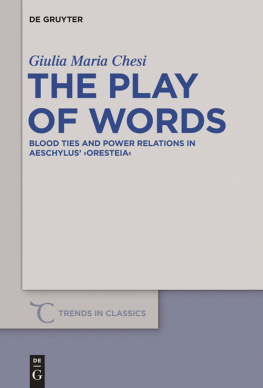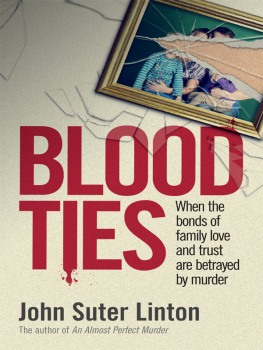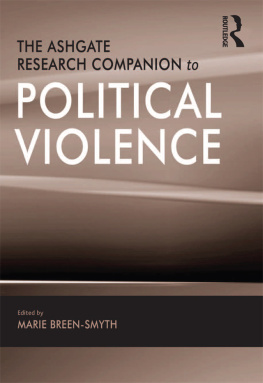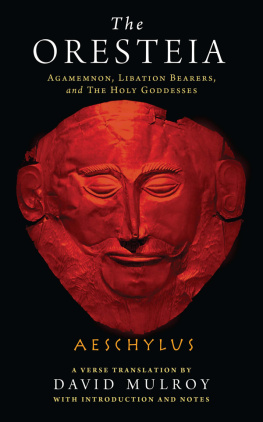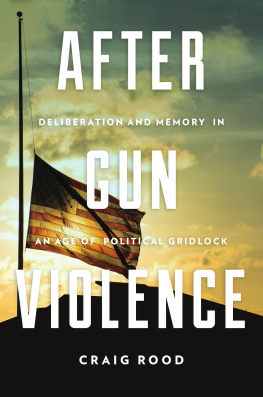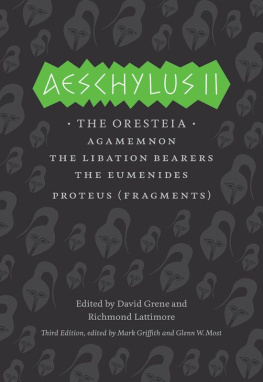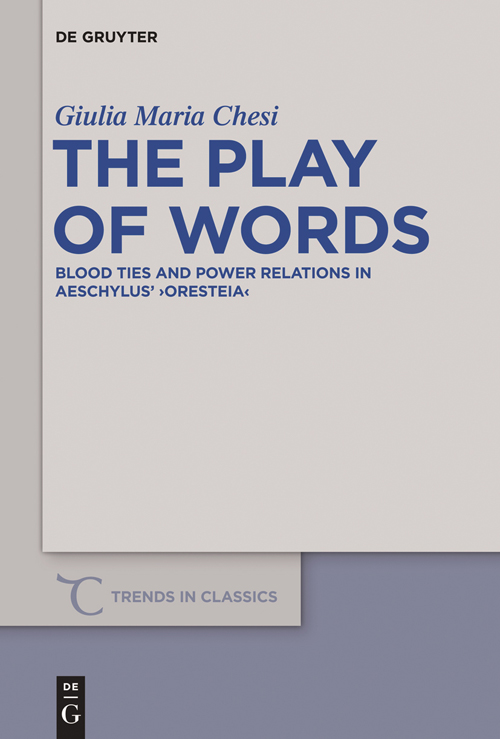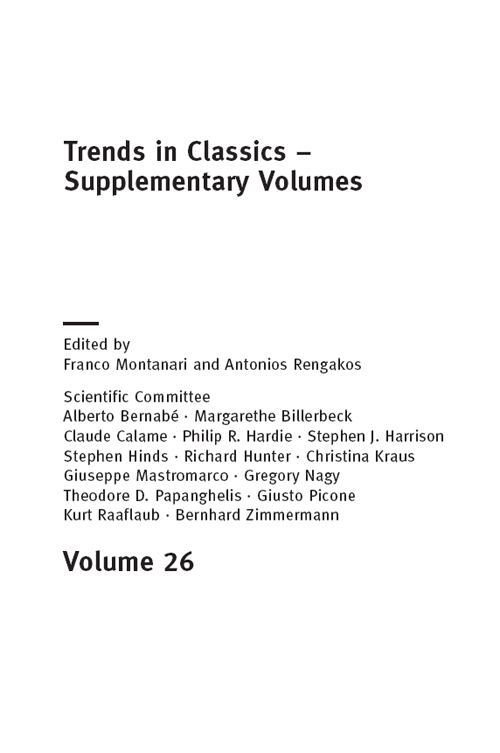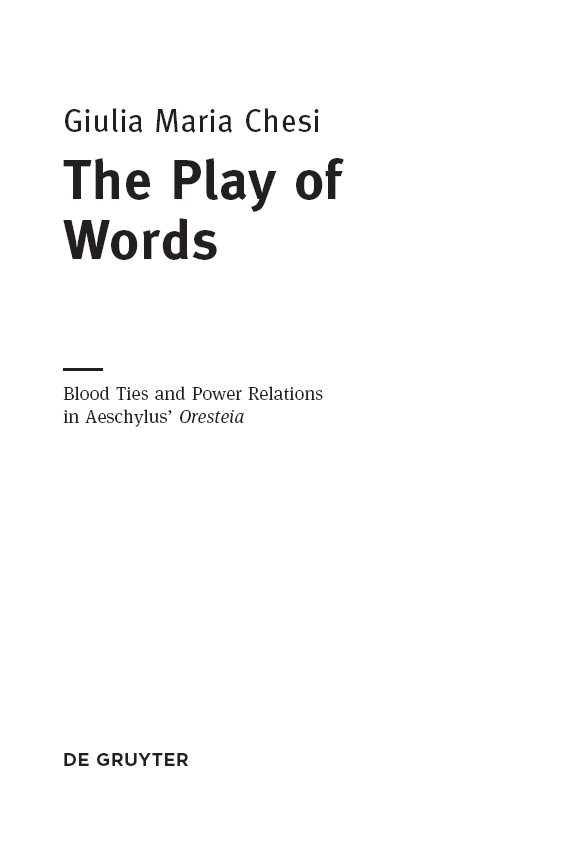A CIP catalog record for this book has been applied for at the Library of Congress.
The Deutsche Nationalbibliothek lists this publication in the Deutsche Nationalbibliografie; detailed bibliographic data are available in the Internet at http://dnb.dnb.de .
Acknowledgments
I wish to thank Anna Di Re DellAnna for her Greek lessons at school; my Cambridge College, the Faculty of Classics, and my friends, Enrico Ventura, Lorenzo Corti, Rachel Bryant Davies, Sherin Saeidi, Giulitta Nardi Perna, Kai Schpe, Tessa Marzotto, Helen van Noorden, Maria Kilby, Paula Ornelas, Francesco Giusti, Marco Formisano and Craig Williams, for their unvaluable support; Agis Marinis, Elton Barker, Pat Easterling, Lucia Prauscello, Renaud Gagn and the anonymous readers of De Gruyter for their precious suggestions; Davide Ruggerini, for the index; Maria Erge (De Gruyter) for editorial assistance.
Especially I thank Froma Zeitlin, for having done the first step; Thomas Poiss for his integrity; Simon Goldhill, il (mio) Maestro, for his deinon example of humility, generosity, patience, and intellectual responsibility in teaching me how to read and how to write; my dad Mario and Licia, for always being there; Jim, for our time in Berlin-Mitte, as he was a child; Laura, for our being sisters; Diego, for his intelligence and our love.
My deepest thanks go to my grand-mom and to Cristinamy mother, my best friendfor having taught their child the social duty of (female) dis-obedience someone has said that it requires less mental effort to condemn than to think Emma Goldman
A Cesarina e alle sue lunghe ore
The term non father does not exist in any realm of social categories
A. Rich, Of Woman Born
More peculiar perhaps, but sadly unsurprising, were the assessments I accepted about fictional women. For example, I quickly learned that power was unfeminine and powerful women were, quite literary, monstrous Bitches all, they must be eliminated, reformed, or at the very least, condemned
L. R. Edwards, Massachusetts Review 13 (1972)
Perhaps this is one of those cases, not infrequent in Aeschylus, in which the word is more important than the man (or woman)
R. P. Winnington-Ingram, Studies in Aeschylus
Abbreviations
| D-P | J. D. Denniston, D. L. Page, Aeschylus: Agamemnon (Oxford 1957). |
| DK | Die Fragmente der Vorsokratiker, ed. H. Diels and W. Kranz (6th edn.; Berlin 1952). |
| KN | The Knossos Tablets. A translation by J. Chadwick, J. T. Killen, J.-P. Olivier (4th edn.; Cambridge 1971). |
| L | Oeuvres compltes dHippocrate, vols. 78, ed.. Littr (Paris 18511853; repr. Amsterdam 1962). |
| LSJ | H. G. Liddell, R. Scott, H. S. Jones, A Greek-English Lexikon, with a Revised Supplement, (9th edn.; Oxford 1996). |
| LSN | S. D. Goldhill, Language, Sexuality, Narrative: The Oresteia (Cambridge 1984). |
| OCD | S. Hornblower, A. Spawforth, The Oxford Classical Dictionary (3rd edn.; Oxford 1996). |
| W | Iambi et elegi Graeci ante Alexandrum cantati , vol. 2, ed. M. L. West (Oxford 1972). |
The editions used are: Agamemnon, Denniston-Page (1957); Choephoroi, Garvie (1986); Eumenides, Sommerstein (1989). Ag .= Agamemnon; Cho. = Choephoroi; Eum.= Eumenides. Other abbreviations follow the common usage for classical abbreviations.
Introduction
How I re-read the Oresteia : language, narrative and womanhood
Lire cest trouver des sens, et trouver des sens, cest les
nommer [] Je nomme, je dnomme, je renomme: ainsi se
passe le texte
R. Barthes, S/Z
Aeschylus is the terror of systematizers
C. J. Harington, Aeschylus
The Oresteia is the tragic story of Orestes, who murders his own mother in revenge for his fathers assassination, and is ultimately acquitted by the court of Athens. In order to understand the dynamics of violence and power involved in the story of Orestes, we need to look at the complex characterisation of Clytemnestra as mother, wife and queen in the trilogy. Critics, starting from Simone de Beauvoir (1949), continuing with Zeitlin in her influential article on misogyny in the Oresteia (1978, repr. 1984 and 1996), Goldhill (1984) and more recently McClure (1997, 1999), Wohl (1998) and Foley (2001), have focused their attention on the negative characterisation of Clytemnestra as a bad mother, an adulterous wife and a female usurper of male power, whose mind is darkened. However, the Aeschylean discourse on motherhood, wifehood and power is much more articulate. Undeniably, the narrative of the play is constantly concerned with the projection of a negative image on Clytemnestra, and thereby we are faced with a successful separation of her role as mother, wife and queen: she is not a mother giving and nurturing life, but an adulterous wife, a tyrant and a foolish female. Such a gesture of separation also implies exerting control over Clytemnestra. The repudiation of her maternal role works as the crucial step in the trilogy towards:
- the definition of bloodlines as paternal (the father is the only genetic parent);
- the definition of motherhood as socially contingent (mother = the wife of the childrens father);
- the authorisation of Agamemnons power in the family and in society ( genitor, husband, head of the family, king, warrior), in order to justify matricide.
This discourse of separation and control over Clytemnestras role as mother, wife and queen allows us to agree with Seidensticker (1995:156) that the power and authority of men, in polis and oikos, remain essentially unquestioned in drama. Yet, this statement might be applied only with some reservations to the Oresteia. In performing this failure, the plays discourse on inter-familial violence introduces a question both on kinship relations (is kinship maternal and/or paternal?) and on power relations (is the authorisation of power feminine and/or masculine?). These questions jeopardize the very condition of the possibility of politics, i. e. of a communal life together in the family and in society according to the authority of the law of the Father.
Thus, my contention is that a re-reading of the Oresteia is required, for the following reasons. First, in my interpretation, we can assume that the play performs a gesture of separation in regard to Clytemnestras female roles, without suggesting any definitive answer to the questions it raises. Second, we can argue that the trilogy is not an assertive and normative text, simply responding to the question Is it true that Clytemnestra either is or is not a mother giving life, and therefore a bad wife and usurper of male power?. Quite the contrary, as I hope to show, the Aeschylean play unfolds as a text, which asks to be read in connection to the related question Who is Clytemnestra, i. e. is she a mother giving and nurturing life, and therefore a bad wife and an usurper of male power?.

